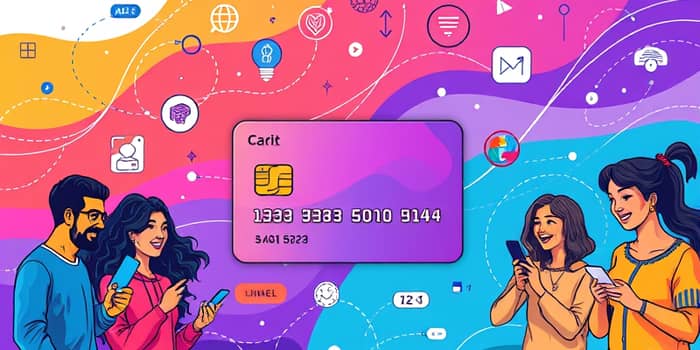In an era where technology and consumer expectations collide, credit card issuers face a unique opportunity: to craft experiences that feel tailor-made for each individual. By harnessing data, artificial intelligence, and a deep understanding of customer needs, financial institutions can transform a basic payment tool into a personalized companion that anticipates desires, offers meaningful rewards, and fosters long-term loyalty.
Consumer Expectations and Trends
Modern cardholders no longer tolerate one-size-fits-all solutions. According to recent research, more than half of consumers expect their banks to use personal data responsibly to enhance their financial experiences. This demand spans demographics, but it is especially pronounced among Gen Z, who are set to open more credit card accounts by 2025 than any other generation.
Alongside generational shifts, digital payments are on the rise. Contactless taps, in-app wallets, and real-time transaction alerts provide the raw material for sophisticated personalization engines. With each swipe or digital wallet transaction, issuers capture insights that can fuel real-time personalized offers and more relevant communications.
These numbers tell a clear story: without data-driven customer experiences, credit card providers risk falling behind more agile competitors.
Technology and AI
The backbone of personalization lies in advanced analytics and artificial intelligence. By examining spending patterns, frequency of purchases, and even location data, AI algorithms can segment customers into micro-audiences and deliver dynamic offers tailored to each segment’s unique behaviors.
Major banks are already deploying AI for underwriting decisions, adjusting credit limits instantaneously based on spending signals, payment timeliness, and risk indicators. This approach not only expedites the approval process but also allows issuers to present targeted credit line adjustments and promotional rates to the right customers, at the right time.
Beyond underwriting, AI-powered chatbots and virtual assistants can provide personalized budgeting advice, alert customers to unusual activity, and suggest optimal ways to maximize rewards based on individual lifestyles. Such interactions foster a sense of partnership rather than mere transaction.
Personalization Strategies
Crafting a deeply personalized credit card experience requires a multifaceted approach. Here are four powerful strategies that can elevate engagement and drive loyalty:
- Co-Branding Partnerships: Collaborate with lifestyle, travel, or retail brands to offer exclusive benefits that resonate with specific customer segments, from airline miles to streaming subscriptions.
- Embedded Finance Solutions: Integrate credit card offers into shopping or travel platforms, enabling seamless approvals and personalized limits without redirecting customers to external sites.
- Exclusive Reward Programs: Design tiered rewards that adapt to individual spending, such as extra cashback on groceries for young families or enhanced travel perks for frequent flyers.
- Data-Driven Campaigns: Use predictive analytics to identify potential churn risks, then deploy targeted retention incentives, like statement credits or bonus points, to keep customers engaged.
Combining these strategies with continuous feedback loops—customer surveys, focus groups, and real-time analytics—ensures that personalization initiatives remain relevant and impactful.
Balancing Personalization with Privacy
While personalization can significantly enhance the customer experience, it hinges on the ethical use of personal data. Consumers are willing to share information when they perceive clear benefits, but they demand transparency and control.
Financial institutions must adopt clear consent frameworks, explaining how data is collected, stored, and used. Offering granular privacy settings—where customers can enable or disable certain personalization features—builds trust and fosters long-term loyalty.
Additionally, security measures such as end-to-end encryption, multi-factor authentication, and regular privacy audits are essential to demonstrate a commitment to safeguarding sensitive information. When customers feel their data is protected, they are more receptive to receiving personalized offers and recommendations.
Future Outlook
Looking ahead, personalization will become even more intuitive and proactive. We can expect credit cards that anticipate upcoming expenses—like recurring subscriptions or annual insurance premiums—and suggest budgeting strategies or advance credit line increases to smooth cash flow.
For Gen Z and younger millennials, mobile-first experiences will dominate, with AI-powered financial coaches embedded directly in digital wallets. Approximately 72% of Gen Z already expect banking services to adapt to their unique lifestyles, from sustainable reward options to peer-to-peer payment integrations.
Innovative features on the horizon include cards that automatically allocate cashback into high-yield savings, or dynamically adjust interest rates based on spending patterns and repayment history. These developments will not only deepen customer relationships but also drive overall financial wellness.
Embracing personalization is no longer optional—it is a strategic imperative. By aligning technological capabilities with genuine customer insights, credit card issuers can create meaningful, long-lasting relationships that transcend mere transactions and pave the way for a new era of customer-centric finance.
References
- https://thefinancialbrand.com/news/personalization/5-emerging-trends-in-personalization-and-cx-for-2025-185743
- https://www.gwi.com/blog/credit-card-trends
- https://fintechtakes.com/articles/2025-02-13/2025-the-year-of-the-credit-card/
- https://www.bankrate.com/credit-cards/news/what-i-learned-at-cardcon-2025/
- https://use.expensify.com/blog/credit-card-statistics
- https://thefinancialbrand.com/news/bank-marketing/why-personalization-mobile-and-trust-are-driving-consumer-ad-trends-in-2025-188961
- https://www.archivemarketresearch.com/reports/card-personalization-system-455819
- https://www.contentful.com/blog/personalization-statistics/










